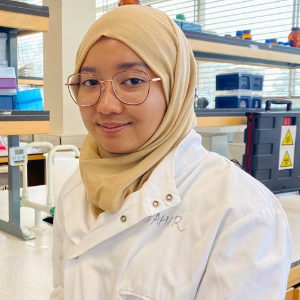Abstract:
Breast cancer is one of the deadliest cancers with 685,000 deaths and 2.26 million cases reported in 2020. Early detection is crucial for better treatment outcome. Mammography is the gold standard screening modality for breast cancer diagnosis but use of a cost-effective companion diagnostic with a high sensitivity and specificity is required to reduce the mortality rates; especially in group perceived to be low risk, e.g., younger women. This study aims to discover the novel biomarkers in liquid biopsies by direct infusion high resolution mass spectroscopy (DI-MS) to facilitate the development of low-cost and high throughput biomarker assay (or panel of biomarker profiles) that could be exploited such as ELISA. Metabolite profiling focused on urine samples from breast cancer (BC; n=9), benign breast disease (BBD; n=31), symptomatic control (SC; n=35) and age-matched healthy control (HC; n=24) groups, using DI-MS. Multivariate statistical analyses used the R-based Metaboanalyst 5.0 platform. Data mining revealed 185 urinary metabolites that significantly (p<0.05) different across the sample groups. Heatmap depicted the expressions (up or down-regulated) of the urinary metabolites were consistent with the high frequency clinical breast tissue metabolic biomarkers related to breast cancer from previous published studies. Partial least squares discriminant analysis (PLS-DA) showed a clear separation between (1) groups (BC vs HC, BC vs BBD and BC vs SC), (2) BC subtypes (luminal A, luminal B, HER2 enriched and triple negative), (3) grades (I, II and III) and (4) stages (metastatic and non-metastatic). Based on pairwise analysis between BC and HC groups, the volcano plot revealed 150 metabolites were significantly up-regulated while 273 were down-regulated. Receiver operator curve (ROC) analysis identified m/z 430.19974, 369.17542 and 370.1783 with accuracies of 0.949, 0.921 and 0.926 respectively with the potential as the diagnostic biomarkers for breast cancer. In conclusion, the encouraging preliminary finding from this study illustrates that urinary metabolites can be a promising adjunct tool to the current breast screening programme which warrant further analysis with larger patients’ cohorts.
Audience Take Away Notes:
- The audience will understand that the easily obtained liquid biopsy, urines, can be used to indicate the presence of breast cancer. Diagnosis can be based on as little as 3-5 biomarkers which singly and combination can be used as the basis of an in-expensive test that could be widely exploited
- Early diagnosis is key for a positive outcome following the diagnosis of cancer. The identification of a small suite of urinary biomarkers for cancer could be the first stages of the development of a test that could be deployed in a primary care or even home setting as part of nationwide screens. This could facilitate the detection of early stage breast cancer
- Key to the successful development of any such study is the testing of our findings in a large population, in many nations, to consider how age, environment, ethnicity or genetic background could influence metabolomic signature urine samples for breast cancer. Therefore, the research needs to be expanded to other research facilities with metabolomic platform(s). This is essential to establishing the validity of our observations
- Although not a short term solution, technology to allow the practical development of an (e.g.) ELISA based test to metabolites is well established. Such a test could be a viable companion test to pre-screen women to triage towards mammogram screening programs. This would make health services more efficient
- The identified biomarker(s) will be therefore essential to design of new tests




